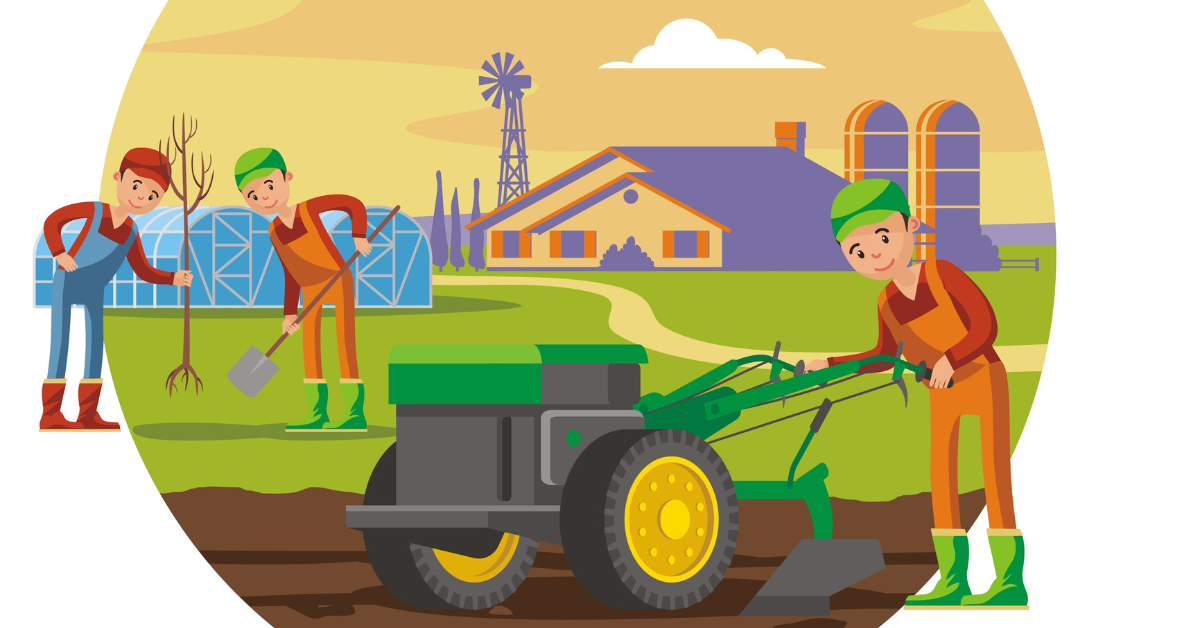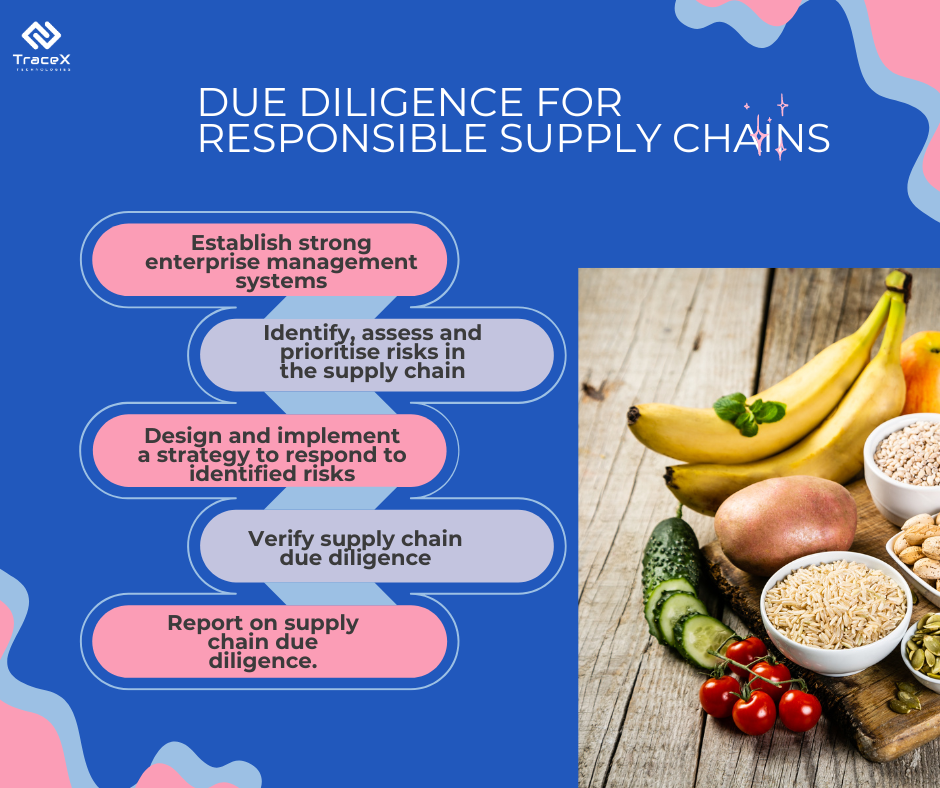Contact: +91 99725 24322 |
Menu
Menu
Quick summary: Explore the significance of responsible agriculture supply chains in fostering sustainability, ethical sourcing, and social responsibility. Learn how transparent and accountable supply chains contribute to environmental conservation, community welfare, and long-term viability in the agricultural sector.

In today’s interconnected world, the concept of responsible agriculture supply chains has garnered significant attention, driven by increasing consumer demand for ethically sourced and sustainable products. From farm to fork, the journey of agricultural products involves numerous stakeholders, each with their own role and responsibilities. However, ensuring that these supply chains operate responsibly presents a complex set of challenges.
According to the Food and Agriculture Organization (FAO), around 70% of rural land worldwide is not formally documented or registered, leading to tenure insecurity for millions of farmers and communities.
Responsible agriculture supply chains are networks of production, distribution, and consumption in the agricultural industry that prioritise ethical, environmental, and socially responsible activities. This includes measures to reduce environmental impact, assure equitable treatment of workers, maintain animal welfare standards, and encourage supply chain transparency.
Responsible agricultural practices are critical for maintaining ecosystem health, conserving natural resources, and promoting community well-being. Farmers and producers who prioritise sustainability can help to prevent environmental deterioration, greenhouse gas emissions, and biodiversity loss. Furthermore, responsible agriculture methods promote social fairness by paying fair salaries and ensuring safe working conditions for agricultural workers, resulting in inclusive and sustainable rural economies. Transparent supply chains also increase consumer trust and confidence in the integrity and ethics of agricultural products, which drives demand for sustainable and sustainably produced food.
Explore innovative strategies for ethical and environmentally responsible sourcing.
Discover how sustainable sourcing practices are transforming the agribusiness landscape
Sustainable farming techniques are critical for guaranteeing the long-term viability of agricultural systems while reducing negative environmental impacts. This includes strategies like crop rotation, organic farming, and integrated pest control, which increase soil health, reduce dependency on synthetic inputs, and protect natural resources for future generations.
Biodiversity protection is critical for ensuring ecosystem resilience and providing vital ecosystem services such as pollination and nutrient cycling. Farmers may help to conserve biodiversity by protecting natural habitats on their land, cultivating different crops, and avoiding the use of toxic pesticides that harm wildlife.
Water conservation and management are crucial for reducing the effects of water scarcity and guaranteeing long-term agricultural production. Farmers can save water and reduce waste by implementing measures such as drip irrigation, rainwater harvesting, and soil moisture monitoring.
Reducing greenhouse gas emissions is critical for limiting climate change’s effects on agriculture. Farmers can reduce their carbon footprint and contribute to global climate change efforts by using strategies such as agroforestry, cover cropping, and livestock methane capture.
Soil health and erosion prevention are critical for sustaining productive farming and reducing nutrient discharge into rivers. Farmers can apply strategies like no-till farming, cover cropping, and contour ploughing to improve soil structure, prevent erosion, and promote nutrient retention, ensuring agriculture’s long-term viability systems.
Ensuring food safety across the supply chain is critical for protecting consumers from health concerns. This includes enforcing strict sanitary measures, checking for toxins on a regular basis, and monitoring conditions throughout the entire manufacturing process, from farm to table. Producers can reduce the risk of foodborne illness while maintaining product quality by adhering to strict food safety standards and regulations.
Quality control procedures are critical for maintaining standards and consistency in food manufacturing. This includes rigorous ingredient selection, painstaking scrutiny of manufacturing procedures, and extensive testing for taste, texture, and nutritional content. By using strong quality control procedures, businesses may deliver items that meet or surpass client expectations, fostering trust and devotion to their brand. Traceability and transparency in food production are critical for people to make educated decisions about what they eat. Traceability technology such as blockchain, RFID, and barcodes enable consumers to track the route of food goods from farm to fork, ensuring authenticity and ethical sourcing. Transparency in labelling and disclosure of ingredients and production techniques boosts trust and confidence in the food sector, promoting healthier and more sustainable food systems.
In responsible agriculture supply chains, community impact plays a crucial role in fostering sustainable practices and ensuring social responsibility. Firstly, supporting local communities and economies involves sourcing from local farmers and producers, thereby empowering them economically and contributing to the growth of rural areas. This not only helps in reducing the carbon footprint associated with transportation but also ensures fair compensation for farmers.
Promoting social responsibility initiatives is another aspect where agriculture supply chains can make a significant impact. This includes initiatives such as fair-trade practices, gender equality programs, and education and healthcare support for communities. By actively engaging in such initiatives, supply chains demonstrate their commitment to ethical practices and contribute to the overall well-being of society.
Furthermore, engaging with stakeholders for positive community impact involves collaboration with local authorities, non-profit organizations, and community leaders. This collaboration can lead to the implementation of projects aimed at improving infrastructure, environmental conservation, and livelihood enhancement in rural areas. By involving stakeholders in decision-making processes, supply chains can ensure that community needs are addressed effectively, fostering long-term sustainability and positive social impact.
In responsible agriculture supply chains, regulatory compliance and certification are vital aspects to ensure adherence to local and international standards for sustainable practices. Compliance with local regulations involves following laws and guidelines set by government authorities regarding environmental protection, labor rights, and product safety. By complying with these regulations, supply chains demonstrate their commitment to operating ethically and responsibly within the legal framework of the regions where they operate.
Moreover, certification programs play a key role in verifying and recognizing responsible agriculture practices. These programs, such as organic certification, fair trade certification, and sustainability certifications, provide third-party validation of adherence to specific standards and criteria related to environmental stewardship, social responsibility, and ethical sourcing. By obtaining certifications, supply chains can enhance their credibility and transparency, as well as differentiate their products in the market as being produced sustainably and responsibly.
Overall, regulatory compliance and certification are essential components of responsible agriculture supply chains, ensuring that operations meet established standards for sustainability, ethical practices, and consumer trust. By upholding these principles, supply chains can contribute to the broader goals of environmental conservation, social equity, and economic viability in agricultural systems.

1. Complexity of Compliance: Meeting diverse local and international regulations can be complex and resource-intensive, especially for supply chains operating across multiple jurisdictions with varying legal requirements.
2. Certification Costs: Obtaining and maintaining certifications for responsible agriculture practices can be costly, particularly for small-scale farmers or suppliers with limited financial resources.
3. Supply Chain Transparency: Ensuring transparency throughout the supply chain, from farm to fork, can be challenging due to the involvement of multiple stakeholders and the lack of standardized traceability systems.
4. Changing Consumer Demands: Keeping pace with evolving consumer preferences and demands for sustainably sourced products requires continuous adaptation and investment in responsible practices.
5. Stakeholder Engagement: Engaging with various stakeholders, including farmers, workers, communities, government agencies, and non-governmental organizations, to align interests and promote responsible practices can be time-consuming and complex.
6. Market Access: Accessing markets that prioritize responsible agriculture products may pose barriers for suppliers, particularly those located in remote or developing regions with limited infrastructure and market connections.
Addressing these challenges requires a concerted effort from all stakeholders involved in the agricultural supply chain, including policymakers, industry players, civil society organizations, and consumers, to drive meaningful change towards more sustainable and responsible practices.
Traceability solutions from TraceX can address the challenges faced in responsible agriculture supply chains by providing the following benefits:
To summarise, while adopting responsible agricultural practices offers hurdles, new trends and technologies provide promising pathways to sustainability and resilience. Stakeholders can overcome hurdles and generate good change by addressing concerns including profitability, resource access, regulatory compliance, and market demands. Embracing practices such as agroecology, regenerative agriculture, and precision farming, as well as utilising digital technologies for transparency and traceability, has enormous promise for enhancing environmental stewardship and fostering vibrant communities. Furthermore, collaborative efforts and knowledge-sharing initiatives are critical for scaling up responsible agriculture methods and increasing their impact. Finally, by continuing to develop and collaborate, the agriculture sector can create a more sustainable and fair future for people and the environment.
